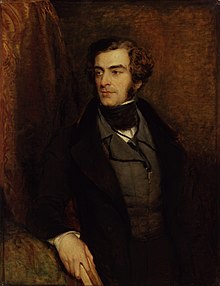Samuel Warren (British lawyer)
Samuel Warren | |
|---|---|
 Samuel Warren (c. 1835-40), by John Linnell. | |
| Born | 23 May 1807 Rackery Farm near Wrexham, Denbighshire |
| Died | 29 July 1877 (aged 70) London |
| Occupation(s) | British writer, lawyer and politician |
Samuel Warren (23 May 1807 – 29 July 1877), was a Welsh barrister, novelist and MP.
Life
He was born at Rackery Farm near Wrexham, Denbighshire, the son of Rev Dr Samuel Warren, a Nonconformist minister, and Anne Warren (née Williams). After studying at the Kingswood School, Bath he entered Edinburgh University to study medicine but then took up law, and became a barrister, wrote several legal text-books, and in 1852 was made Recorder of Hull.
Warren sat in the House of Commons for Midhurst 1856–1859, and was a Master in Lunacy 1859-77. He was the author of Passages from the Diary of a late Physician, which appeared (1832–37) first in Blackwood's Magazine, as did also the novel Ten Thousand a-Year (1839). Both attracted considerable attention, and were often reprinted and translated. The novel was based on the Alexander Humphrys-Alexander Stirling forgery case, where a claim was made to a vacant earldom using fake documents. The shallow, profligate young protagonist, Titbat Tittlemouse, is said to be based on Edward Oxford, who tried to assassinate Queen Victoria.
His last novel, Now and Then (1847), was a social novel of criminality and the law, arguing from a Methodist perspective the moral case for reform. It is realistically observed, based in outline on an actual case in Wolverhampton, but had little success. Some critics thought Warren entertained exaggerated ideas as to the importance of his place in literature. However, his best known work, Ten Thousand a Year, contains social satire rivalling that of Thackeray, but written from a Tory standpoint.
He was elected a Fellow of the Royal Society in April 1835.[1] He died in London.
References
- ^ "Library and Archiv catalogue". Royal Society. Retrieved 30 October 2010.[permanent dead link]
 This article incorporates text from a publication now in the public domain: Cousin, John William (1910). A Short Biographical Dictionary of English Literature. London: J. M. Dent & Sons – via Wikisource.
This article incorporates text from a publication now in the public domain: Cousin, John William (1910). A Short Biographical Dictionary of English Literature. London: J. M. Dent & Sons – via Wikisource.
